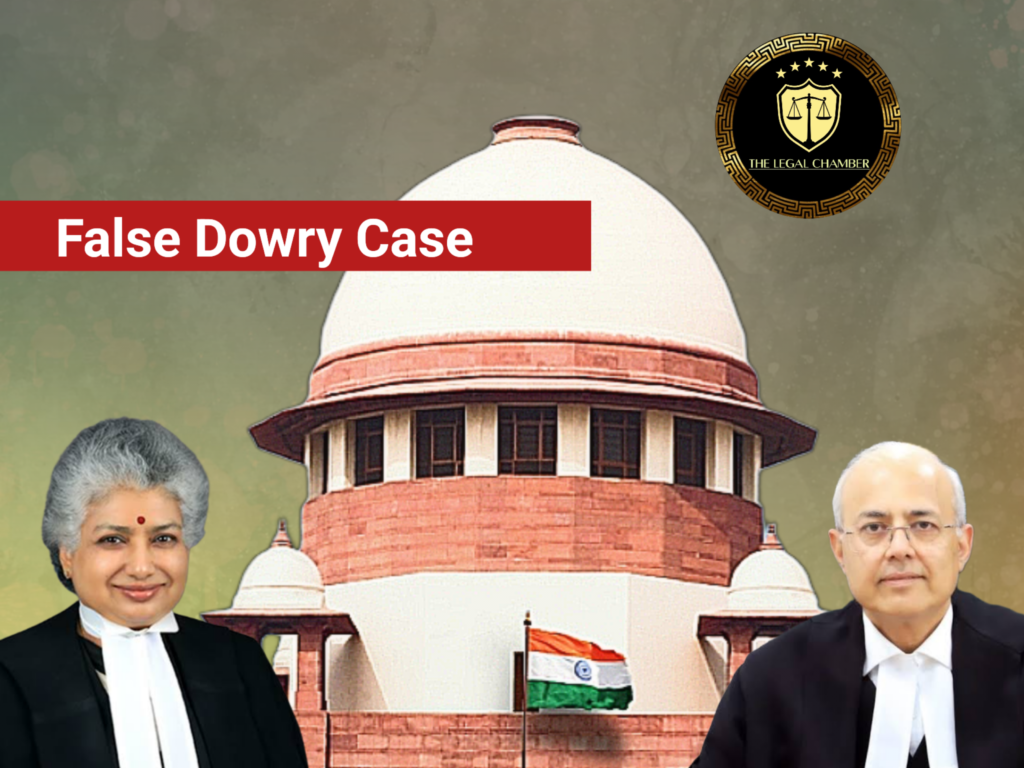
The Supreme Court acquitted the appellant under Section 498A IPC and Section 4 of the Dowry Prohibition Act, 1961, holding that vague and unsubstantiated allegations without specific instances or corroborative evidence cannot sustain a conviction. The Court emphasized that mere allegations of cruelty or dowry demand, unsupported by material particulars, fail to meet the legal threshold. It cautioned against the misuse of protective laws to rope in family members without concrete proof, reaffirming that prosecution must establish guilt beyond reasonable doubt. The judgment highlights the necessity of precise allegations and independent evidence in matrimonial offences.
Facts Of The Case:
The case revolves around allegations of dowry harassment and cruelty under Section 498A of the IPC and Section 4 of the Dowry Prohibition Act, 1961. The appellant, Rajesh Chaddha, was accused by his wife, Mala Chaddha, of subjecting her to mental and physical torture for not meeting dowry demands. The couple married on 12.02.1997, but cohabited only for about 12 days in September 1998. The wife alleged that the appellant and his family forced her to resign from her teaching job, demanded Rs. 2 lakhs, and physically assaulted her, leading to a miscarriage. She also claimed they made her consume alcohol-laced milk and humiliated her at parties.
The FIR was lodged in 1999, after the husband filed for divorce in February 1999. The trial court convicted the appellant under Section 498A IPC and Section 4 of the DP Act, but acquitted him of charges under Sections 323 (hurt) and 506 (criminal intimidation) due to lack of medical evidence. The Sessions Court and High Court upheld the conviction.
On appeal, the Supreme Court overturned the conviction, noting the lack of specific details, dates, or independent evidence to support the allegations. It observed that the FIR appeared retaliatory (filed after divorce proceedings) and criticized the tendency to misuse dowry laws without credible proof. The Court emphasized that generalized accusations without corroboration cannot sustain a conviction.
Procedural History:
The case began with the FIR registered in 1999 at the Women Police Station, Lucknow, under Sections 498A, 323, 506 IPC and Sections 3 & 4 of the Dowry Prohibition Act, 1961. The Chief Judicial Magistrate, Lucknow, convicted the appellant under Section 498A IPC and Section 4 of the DP Act in 2004, sentencing him to imprisonment and fines, while acquitting him of other charges due to insufficient evidence. The appellant filed a Criminal Appeal (No. 88/2004) before the Additional Sessions Judge, Lucknow, which was dismissed in November 2004, upholding the trial court’s conviction.
Subsequently, the appellant approached the Allahabad High Court through a Criminal Revision (No. 612/2004), which was dismissed in November 2018, affirming the lower courts’ decisions. A recall application against this order was also rejected. The appellant then moved the Supreme Court via Special Leave Petitions (SLP (Crl.) Nos. 2353-2354 of 2019), which granted leave and heard the appeal. In May 2025, the Supreme Court set aside the conviction, acquitting the appellant due to lack of credible evidence and vague allegations, while criticizing the misuse of dowry laws. The pending applications, if any, were disposed of accordingly.
Read Also: Supreme Court Rules on Tenancy Dispute: Owner’s Redevelopment Rights Prevail Over Family Settlement Claim
Court Observation:
The Supreme Court made significant observations while overturning the conviction. It noted that the allegations of cruelty and dowry demands were vague, lacking specific instances, dates, or independent corroboration. The Court emphasized that mere assertions without material particulars cannot meet the threshold for conviction under Section 498A IPC or the Dowry Prohibition Act.
It criticized the absence of medical evidence to substantiate claims of physical assault or miscarriage, observing that the prosecution failed to prove guilt beyond reasonable doubt. The Court also highlighted the timing of the FIR, registered after divorce proceedings were initiated, raising doubts about its bona fides and suggesting a possible retaliatory motive.
Additionally, the judgment cautioned against the misuse of protective laws, stressing that generalized accusations without concrete proof lead to unnecessary harassment. The Court reaffirmed that criminal liability must be based on credible evidence, not mere suspicion or unsubstantiated allegations. Ultimately, it ruled that the conviction was unsustainable due to legal and factual infirmities in the prosecution’s case.
Final Decision & Judgement:
The Supreme Court, in its final judgment dated May 13, 2025, allowed the appeal and acquitted the appellant (Rajesh Chaddha) of all charges under Section 498A IPC and Section 4 of the Dowry Prohibition Act, 1961. The bench comprising Justices B.V. Nagarathna and Satish Chandra Sharma set aside the concurrent findings of the Trial Court, Sessions Court, and High Court, holding that the prosecution had failed to establish guilt beyond reasonable doubt. The Court emphasized that the allegations were unsubstantiated, lacked material particulars, and were unsupported by independent evidence, rendering the conviction legally unsustainable.
Notably, the judgment underscored the absence of medical proof for the alleged physical cruelty and miscarriage, as well as the suspicious timing of the FIR filed after divorce proceedings. While acknowledging the seriousness of dowry-related offenses, the Court cautioned against the misuse of such laws through vague and exaggerated claims. The pending applications, if any, were disposed of accordingly, bringing an end to the two-decade-long legal battle. The ruling reaffirmed the principle of “innocent until proven guilty” and stressed that criminal liability cannot be based solely on uncorroborated allegations in matrimonial disputes.
Case Details:
Case Title: Rajesh Chaddha vs. State of Uttar Pradesh Citation: (2025) INSC 671 (Supreme Court of India) Criminal Appeal No.: [Arising out of SLP (Crl.) Nos. 2353-2354 of 2019] Date of Judgment: May 13, 2025 Judges/Justice Name: Justice B.V. Nagarathna & Justice Satish Chandra Sharma
Download The Judgement Here